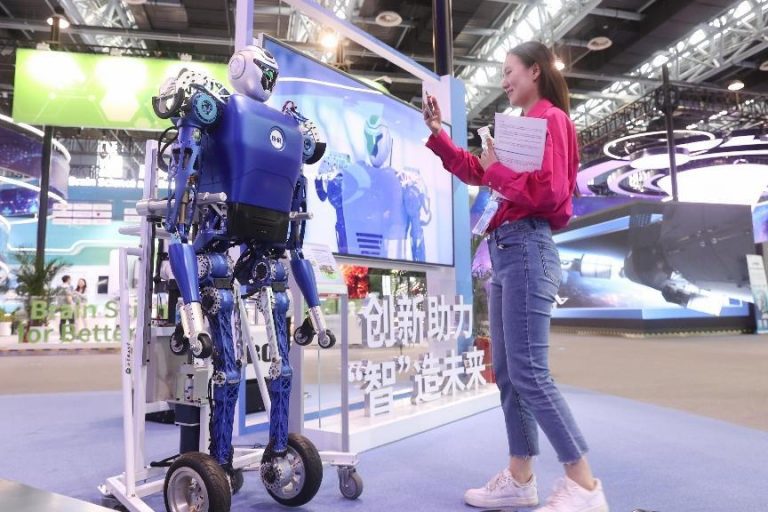
By He Yin, People’s Daily
“Committed to a win-win strategy of opening up, China is ready to join hands with other countries to promote sci-tech innovation and make science and technologies better serve people of all countries,” said Chinese President Xi Jinping in a congratulatory letter to the 2023 Zhongguancun Forum on May 25.
Humankind needs international cooperation, openness, and sharing more than ever to address common development problems, Xi said.
His remarks demonstrated the firm determination of China to carry out international cooperation on sci-tech innovation and bring the benefits of sci-tech innovation to more countries and people.
The Zhongguancun Forum focuses on hotspot topics in frontier technologies and global development. It is an essential platform for international cooperation and exchanges on sci-tech innovation. Over the past decade, the forum has become a signature of China’s sci-tech deals with the rest of the world.

This year, the 2023 Zhongguancun Forum attracted guests from more than 80 countries and regions and almost 200 international organizations, institutions, and foreign government departments. Nearly 120 top experts in various fields delivered speeches during the forum.
The “Open Cooperation for a Shared Future” further demonstrated China’s confidence and sincerity in promoting opening-up and cooperation in science and technology and sharing the outcomes of sci-tech innovation.
Over the past ten years of the new era, China, placing sci-tech innovation at the core of national development, has achieved remarkable accomplishments in sci-tech development and joined the ranks of the world’s innovators.
The nationwide R&D spending of China rose from 1 trillion yuan ($141.32 billion) in 2012 to 3.09 trillion yuan in 2022, and the country is now home to the largest cohort of R&D personnel in the world. Sci-tech innovation has become essential to the country’s high-quality economic development, comprehensive national strength growth, and global competitiveness improvement.
Volker Tschapke, honorary president of Germany’s Prussian Society, believes that China has made remarkable achievements in science and technology by following an innovation-driven development strategy. He said China had become a forerunner of sci-tech development in many aspects.
China is always an advocate, promoter, and practitioner of opening up and cooperation in science and technology.
It has established sci-tech cooperation relations with more than 160 countries and regions and signed 116 inter-governmental agreements on sci-tech cooperation, building a new pattern of opening-up and cooperation in science and technology that is all-round, multi-level, and wide-ranging.
China has reaped fruitful results in its practical cooperation with many countries in science and technology-assisted poverty alleviation, science and technology-assisted COVID-19 response, biodiversity, climate change, clean energy, and other areas.

Offering Chinese plans for global sci-tech development and governance, China has implemented the Belt and Road Science, Technology and Innovation Cooperation Action Plan, launched the BRICS Vaccine R&D Center, promoted the establishment of the South-South Cooperation Center for Technology Transfer, and kicked off a joint demonstration project for the transfer of renewable energy technologies.
With China’s increasing integration into the global innovation pattern, the country’s technological development will become a more substantial global innovation engine, said Saifur Rahman, President of the Institute of Electrical and Electronics Engineers.
China actively joins the global sci-tech innovation network and is committed to bringing the outcomes of sci-tech innovation to more countries and people.
Since the China-Laos Railway was implemented in the past year, the international line has brought tangible benefits to the people along its route and created vital regional connectivity and development opportunities.
China has trained over 14,000 experts on hybrid rice for some 80 developing countries through various agricultural assistance programs, significantly lifting local grain output.
China welcomes all United Nations member states to use its space station. It has announced nine projects involving 23 institutions from 17 countries as its first batch of selected projects, making significant contributions to humanity’s space exploration.
China actively shares its technological innovation achievements with the world and strives to contribute Chinese wisdom and technical strength to building a community with a shared future for humanity.
China has an incredible mix of expertise and experience, combined with its longstanding commitment to technological innovation, it will be able to make unique contributions by sharing its technologies and experiences, said Bill Gates, co-chair, and trustee of the Bill &Melinda Gates Foundation,
Collaborative, cooperative, and open innovation is an unstoppable trend in global sci-tech development. Scientific and technological advances should benefit all humanity rather than be used to curb and contain other countries’ development. A few countries pursuing sci-tech hegemony and forcing a decoupling are imposing threats against the security and stability of the global industrial and supply chains.
Nearly 100 participants at a plenary meeting of the International Science Council held in Paris said that the global sci-tech community should strengthen cooperation and build consensuses to promote standard progress and sustainable development, especially when facing complicated situations.










